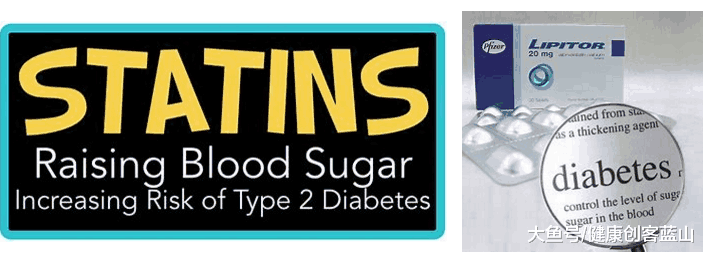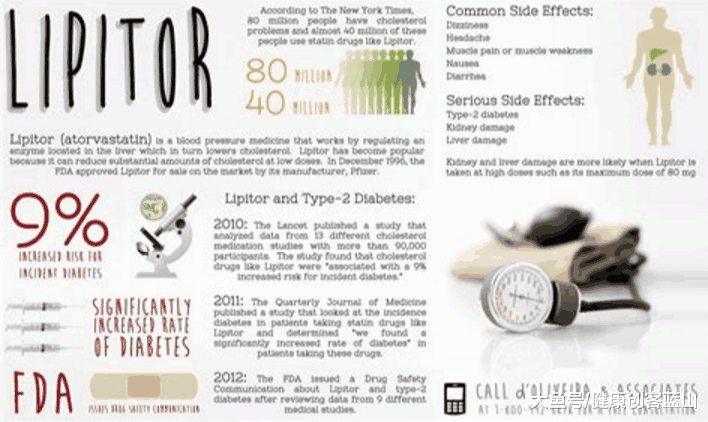1162患者对制药厂提起诉讼,要求赔偿由于服用降胆固醇药物立普妥(Liptor)导致的损失
1162 Lawsuits Filed Against Pfizer for Damages due to Lipitor
今年8月(2014),辉瑞公司因降胆固醇药立普妥(Liptor)而提起的诉讼达到1162起。自4月份以来,几乎所有的病例都被记录在案,当时一项新的研究将女性的2型糖尿病与流行的他汀类药物联系起来。为受害者提出索赔的律师表示,这些案件很可能达到1万起。
The drug’s active ingredient is atorvastatin calcium.
降胆固醇的他汀类药物是一个每年1000亿美元的产业。立普妥是迄今为止人类历史上所有药品中最赚钱的药物,更不用说在2011年底专利到期前成为最赚钱的胆固醇药物了。迄今为止,这种降胆固醇的他汀类药物的销售额已超过1400亿美元。
立普妥公司受益于1997年市场营销法的变化,该法律允许美国制药公司直接向消费者宣传其产品。辉瑞公司说服了整整一代美国人,他们需要一种药丸来降低胆固醇以预防心脏病,这将成为有史以来最聪明、最不道德的营销计划之一。
。。。FDA首次发布了针对他汀类药物的警告,这些药物包括: 肝损伤、记忆丧失、糖尿病和肌肉损伤
在立普妥(Liptor)的专利于2011年底到期后,FDA首次发布了针。对他汀类药物的警告,这些药物包括: 肝损伤、记忆丧失、糖尿病和肌肉损伤。在发布这些警告后不久,诉讼就开始慢慢出现。如今,随着越来越多的研究报告将他汀类药物的使用与各种副作用联系起来,这些诉讼已成为一股浪潮,尽管你不太可能在主流媒体上听到这方面的消息。
以下是菲尔兹律师事务所律师史蒂夫·菲尔兹提出的常见问题:
为什么人们要起诉立普妥?
数以百计的产品责任诉讼已经对辉瑞公司提起,声称其畅销药物会增加新发2型糖尿病的风险。
处方药通常会引起副作用。制造商有责任向公众发出警告。辉瑞正在审理的案件指控该公司没有充分警告用户他们可能会成为糖尿病患者。一些原告指控辉瑞公司故意向公众隐瞒风险。
有证据表明立普妥引起糖尿病吗?
从1994年以来的大量研究中观察到的数据一致显示,选择服用阿托伐他汀(atorvastatin)的人群罹患该疾病的风险高于平均水平。
研究发现,与服用simvastatin)的人相比,所有3项研究中使用立普妥的人患糖尿病的几率更高
例如,2011年发表在《美国心脏病学会杂志》(Journal of the American College of Cardiology)上的一项研究,对涉及立普妥(Lipitor)的3项独立试验的数据进行了分析。研究人员发现,与服用安慰剂和服用另一种他汀类药物(simvastatin)的人相比,所有3项研究中使用立普妥的人患糖尿病的几率更高。
发表在《柳叶刀》(Lancet)、《美国医学会杂志》(Journal of The American Medical Association)和《美国医学会杂志内科学》(JAMA Internal Medicine)上的其他研究也显示了类似的结果,这使得研究人员相信,可能会增加立普妥引发糖尿病的风险,尤其是女性。
为什么辉瑞没有警告公众这种危险?
自1996年以来,阿托伐他汀为辉瑞公司创造了超过1300亿美元的收入。可以肯定的是,披露立普妥和糖尿病之间可能存在的联系会对销售产生负面影响。许多原告公开推测,辉瑞为了保护其收入来源,隐瞒了风险。
FDA知道立普妥和糖尿病之间的联系吗?
FDA在2012年发布了一份公开的新闻稿,宣布一些患者在使用立普妥等药物后出现了高血糖和新发2型糖尿病。该机构指出,它将监督药品安全标签的变化。尽管存在这种风险,FDA仍认为不适合召回立普妥。
https://s.click.taobao.com/xJt8MNw
1162 Lawsuits Filed Against Pfizer for Damages due to Lipitor
Medications
Health Impact Editor Comments:
Lawsuits filed against Pfizer for their blockbuster cholesterol-lowering drug Lipitor reached 1162 cases filed in August. Almost all of theses cases have been filed since April, when a new study was released linking Type 2 diabetes in women with the popular statin drug. Attorneys filing claims for the victims have stated the cases could well reach 10,000.
Cholesterol-lowering statin drugs are a $100 billion a year industry. Lipitor is by far the most profitable drug in the history of mankind among all pharmaceutical products, let alone being the most profitable cholesterol drug before its patent expired at the end of 2011. Sales to date from this one particular cholesterol-lowering statin drug have exceeded $140 billion.
Lipitor benefited from the change in marketing laws in 1997 that allowed pharmaceutical companies in the U.S. to advertise their products directly to consumers. Pfizer convinced an entire generation of Americans that they needed a pill to lower their cholesterol in order to prevent heart disease, in what will go down as one of the most brilliant and unethical marketing schemes of all time.
After Lipitor’s patent expired at the end of 2011, the FDA issued its first warnings against statin drugs, which includes: liver injury, memory loss, diabetes, and muscle damage. Soon after issuing these warnings, the lawsuits started trickling in. Today, with more and more studies being published linking statin drug use to various side effects, those lawsuits have become a tidal wave, even though you are not likely to hear much about this in the mainstream media.
Here is a FAQ put out by attorney Steve Fields of the Fields Law Office:
Why Are People Filing Lipitor Lawsuit Claims?
Hundreds of product liability lawsuits have been filed against Pfizer, claiming its blockbuster medication introduces an increased risk of new-onset type 2 diabetes.
Prescription medications commonly cause side effects. Manufacturers have a responsibility to warn the public about them. The cases pending against Pfizer allege the company neglected to adequately warn users that they might become diabetic. Some plaintiffs have accused Pfizer of purposely hiding the risk from the public.
Is There Evidence That Lipitor Causes Diabetes?
Observational data from numerous studies dating back to 1994 consistently show that select groups taking atorvastatin are at a higher-than-average risk of developing the disease.
For example, a 2011 study appearing in the Journal of the American College of Cardiology examined data from 3 separate trials involving Lipitor. The authors showed that Lipitor users in all 3 studies developed diabetes at a higher rate compared to individuals given a placebo and individuals given a different statin (simvastatin).
Other studies published in The Lancet, Journal of the American Medical Association, and JAMA Internal Medicine have shown similar results, leading researchers to believe that there may be an increased risk of Lipitor causing diabetes, especially in women.
Why Didn’t Pfizer Warn The Public About The Danger?
Since 1996, atorvastatin has generated more than $130 billion in revenue for Pfizer. It’s safe to assume that disclosing a possible link between Lipitor and diabetes would have negatively affected sales. Many plaintiffs have openly speculated that Pfizer concealed the danger in order to protect its revenue stream.
Does The FDA Know About The Link Between Lipitor And Diabetes?
The FDA issued a public news release in 2012 announcing that some patients had reported high blood sugar levels and new-onset type 2 diabetes after using drugs like Lipitor. The agency noted that it would oversee safety labeling changes on the drugs. Despite the risk, the FDA has not yet seen fit to issue a Lipitor recall.
1162 Lawsuits Filed Against Pfizer for Damages due to Lipitor http://healthimpactnews.com/2014/1162-lawsuits-filed-against-pfizer-for-damages-due-to-lipitor/


.png)

.png)
.png)